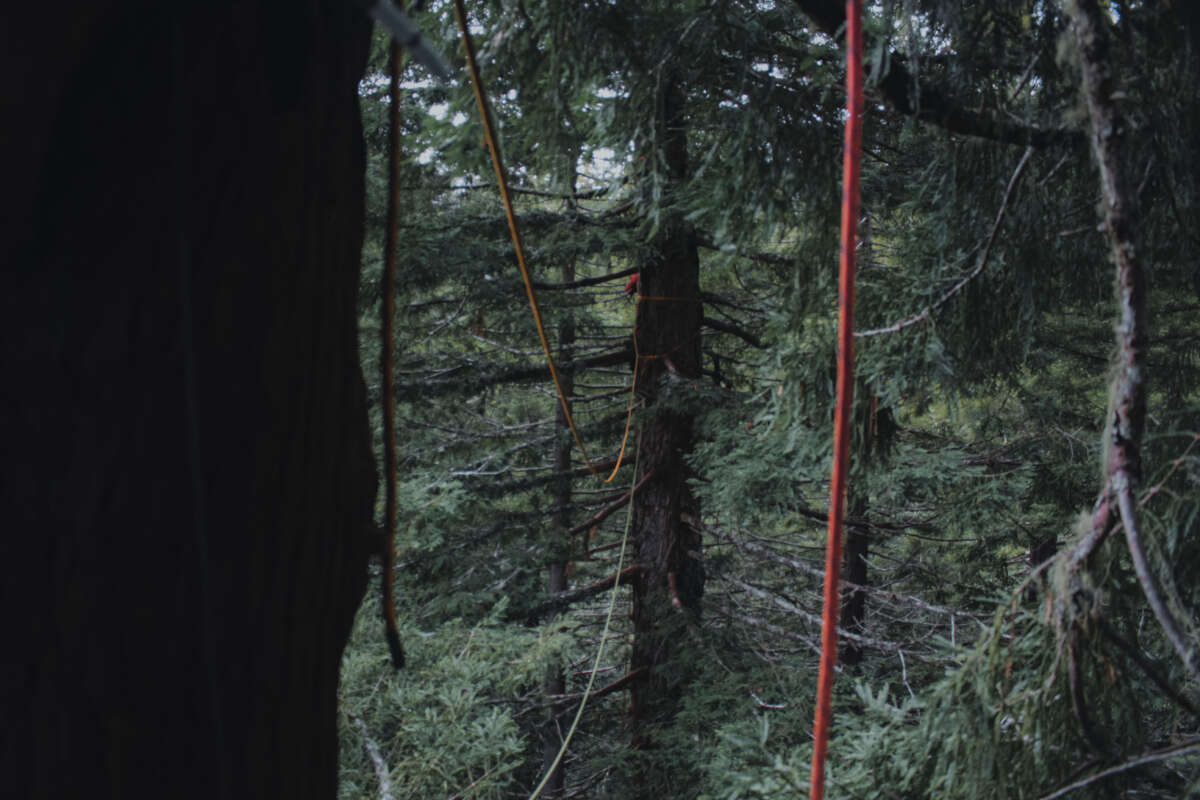Support justice-driven, accurate and transparent news — make a quick donation to Truthout today!
It’s like this in the olive groves in Palestine.
For years, settlers and soldiers have set fire to and uprooted trees and attacked Palestinian olive harvesters in an attempt to further sever the people from their land. The olive trees are more than just a source of income, and indeed survival, for Palestinian farmers. They represent tradition and a culture of mutualism, and are a symbol of both life and struggle. It’s perhaps both ironic and apt that olive branches are also a symbol of peace. Talaat Abu Jiyab, a Palestinian farmer in Gaza, told Middle East Today back in 2021 that, “Whether we are in the West Bank, the Gaza Strip, the border areas or far from the border areas, we consider this tree like one of our children.”
A world away, in the forests of Northern California, a tree-sitter who goes by Pat gets comfortable on the plush forest floor. “I have all these talking points,” they say, shrugging. “But a lot of days I wake up and I’m just like, ‘I’m just here because I started living in this tree because a corporation marked it with a blue line and said they were going to truck it off to the sawmill, … and now I’m in love with this tree,’” they laugh. “I really don’t want her to die.” I laugh along with them. And we both take a moment to look up, roughly 200 feet, to the soft green crowns of this redwood forest.
It’s what we might learn from the trees that is most important, a lesson that could topple empires and safeguard our future.
Redwoods are some of the most carbon-dense trees in the world. Along with the olive tree and all others, they suck up our sins and convert them to life. They and their root systems are vital members of a cohesive ecosystem that defends against soil erosion, desertification and other crises of climate chaos. And while the science of these trees is important, I would argue that it’s not the most important part. Rather, it’s what we might learn from the trees that is most important, a lesson that could topple empires and safeguard our future.
As Powhatan-Renapé and Lenape historian and writer Jack D. Forbes wrote:
I can lose my hands, and still live. I can lose my legs and still live. I can lose my eyes and still live. I can lose my hair, eyebrows, nose, arms, and many other things and still live. But if I lose the air I die. If I lose the sun I die. If I lose the earth I die. If I lose the water I die. If I lose the plants and animals I die. All of these things are more a part of me, more essential to my every breath, than my so-called body. What is my real body?
In other words, a reciprocal and respectful relationship with nature based upon the understanding that we are, of course, a part of nature (and cannot survive apart) is the antithesis of capitalist and colonialist ideologies — and therefore, a threat to both.
Take Ireland as a prime example. In the late 1500s, the Emerald Isle was a testing ground for the burgeoning blend of capitalism and colonialism. As Peter Linebaugh and Marcus Rediker note in their book, The Many-Headed Hydra, Ireland was “where English conquerors had already begun to defoliate the woods to defeat a kin-based society that shared its principal resources.”
From there colonialism stole across the globe — the battering ram of capitalism — and ancient and stewarded forests fell to the ax, along with the peoples who lived with them. Here, in what is now the United States, slaughter and forced migration took 99 percent of Indigenous people’s lands for the sake of industry and capital.
Of the some 2 million acres of old growth redwood forests that once existed in the Pacific Northwest, only about 2 percent remain. And there is no law against chopping down a 2,000-year-old tree.
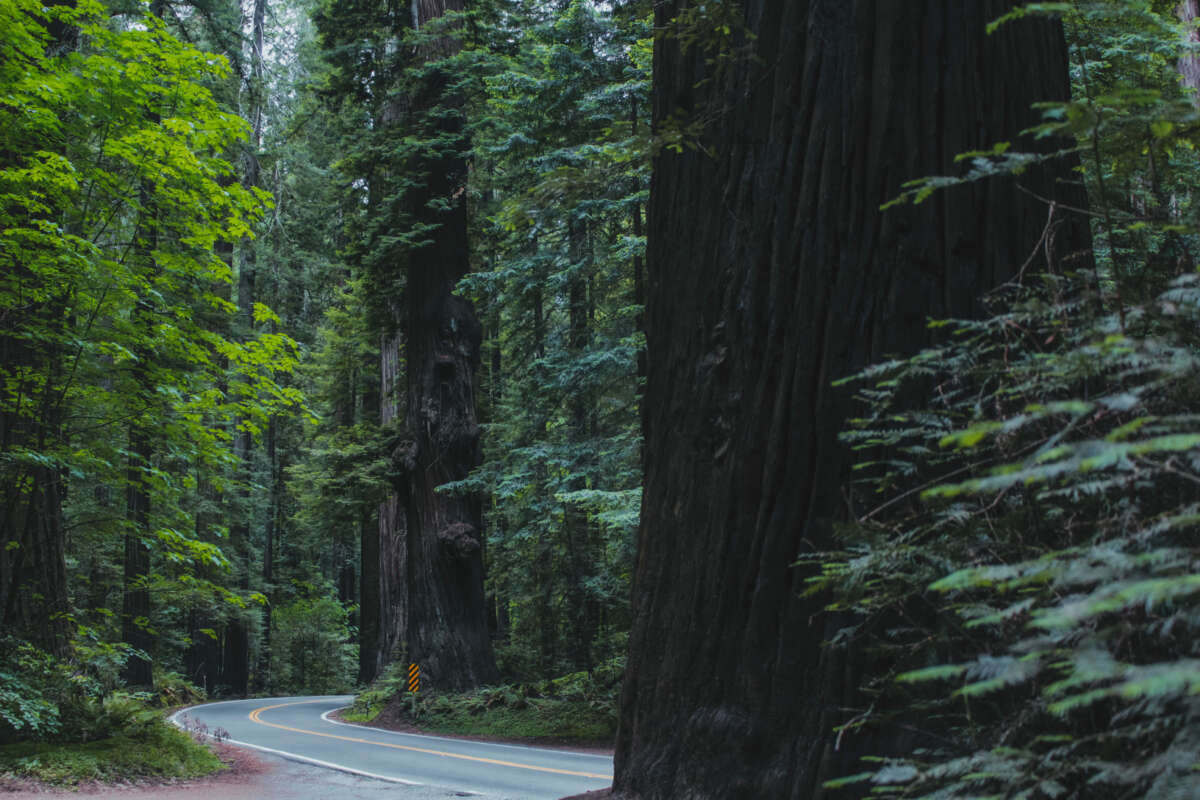
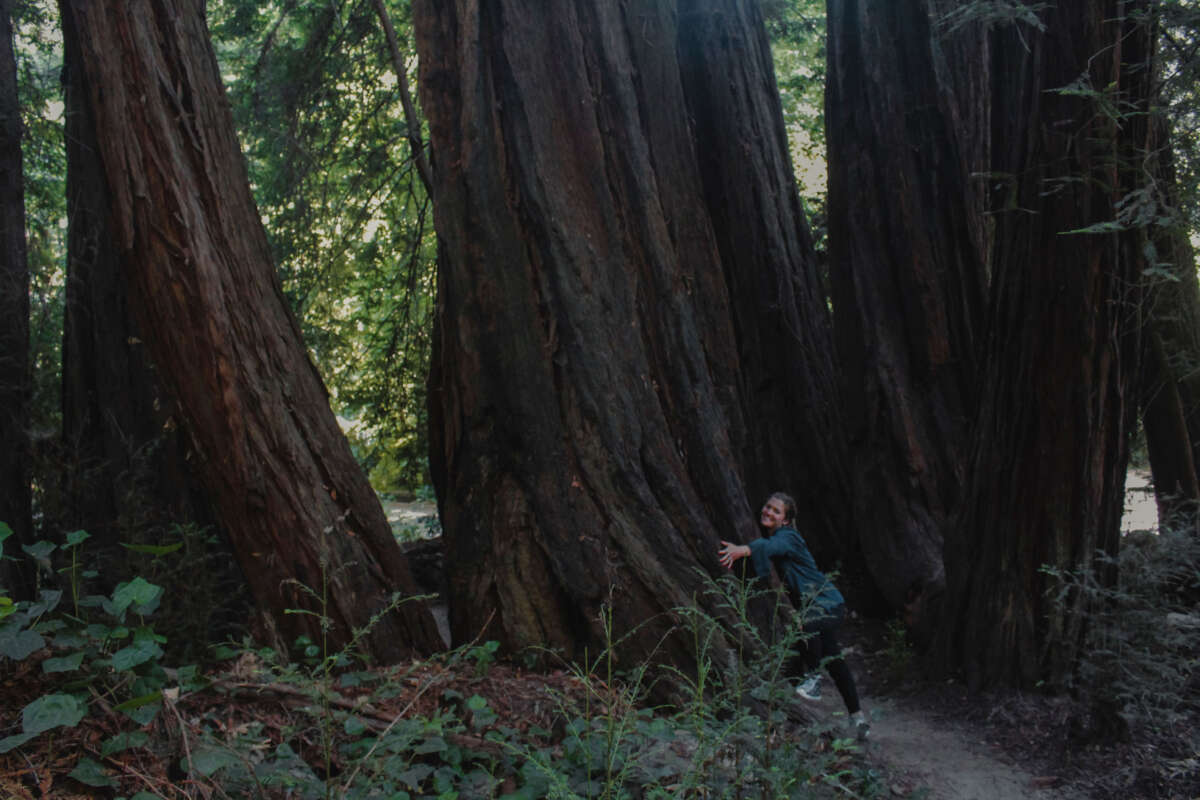
At the core of both capitalism and colonialism is the understanding that nothing natural is inherently valuable. People are only as valuable as they can be used as slaves, cannon fodder, dutiful workers, etc. Land, air and water are only as useful as they can be mined, fracked, drilled, diverted, overfished, etc. All must be conquered and distorted, and in the process we ourselves become conquered and distorted.
“The land was free to be who it wished, and the animals were, and the water got to flow where it wished to flow. And that means that humans got to do that too,” said Marnie Atkins, a member of the Wiyot tribe whose ancestral lands include what is now Eureka, Arcata and McKinleyville in Northern California. “When you start fencing things in and building things like ‘this is my plot of land, this is my parcel,’ I think you also fence in your own mind.” She added that when humans become “so obsessed with mine, mine, mine, … that’s what you perpetuate. You pass that obsession on to your children.”
Our society purports to be obsessed with “freedom,” but it is so remarkably unfree, tied to a suicidal obsession passed down through generations of perverse dealings with both people and planet. This morbid juxtaposition is precisely why the system seeks to silence those who try to change our society through direct action, or simply by living differently.
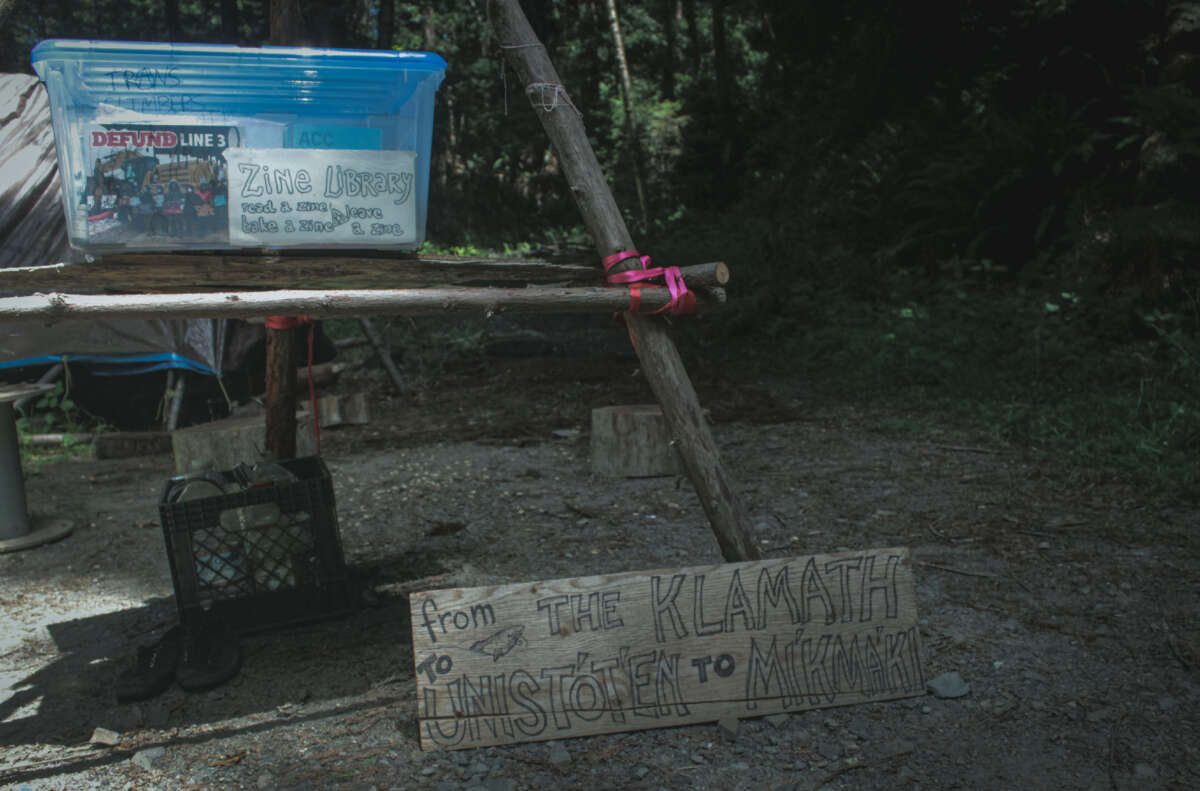
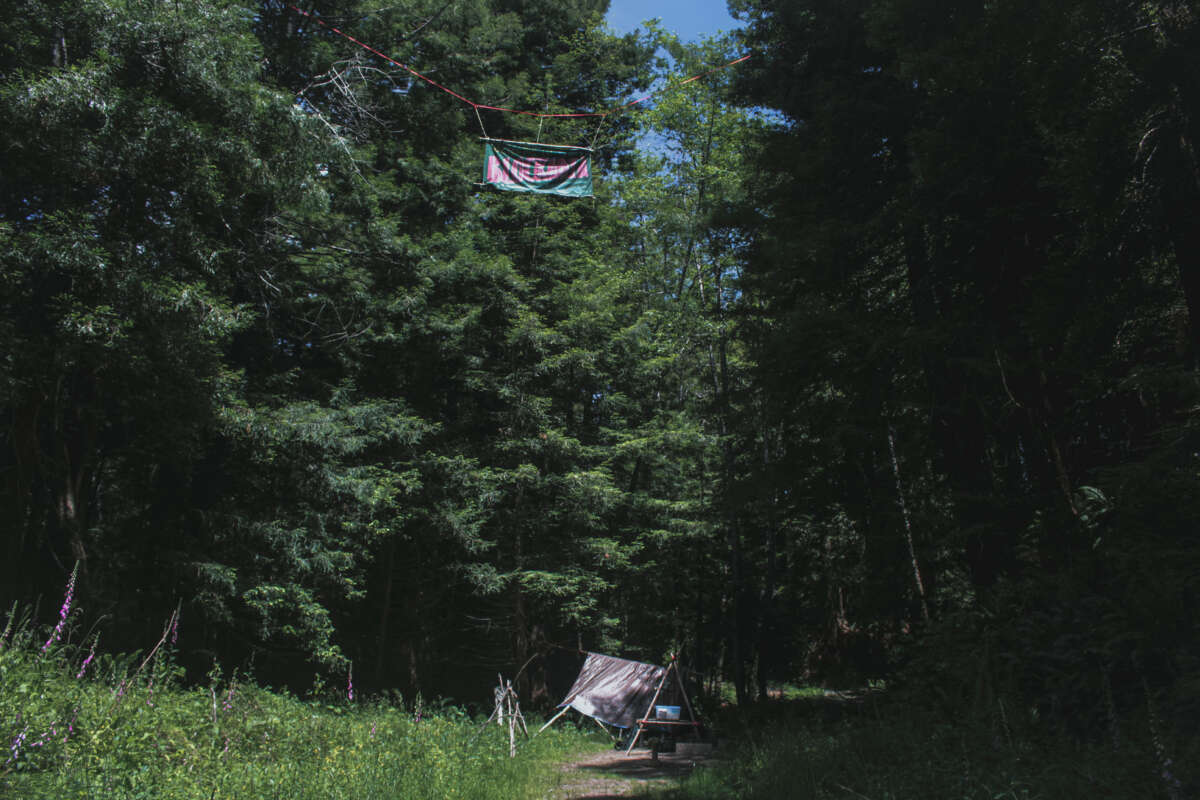
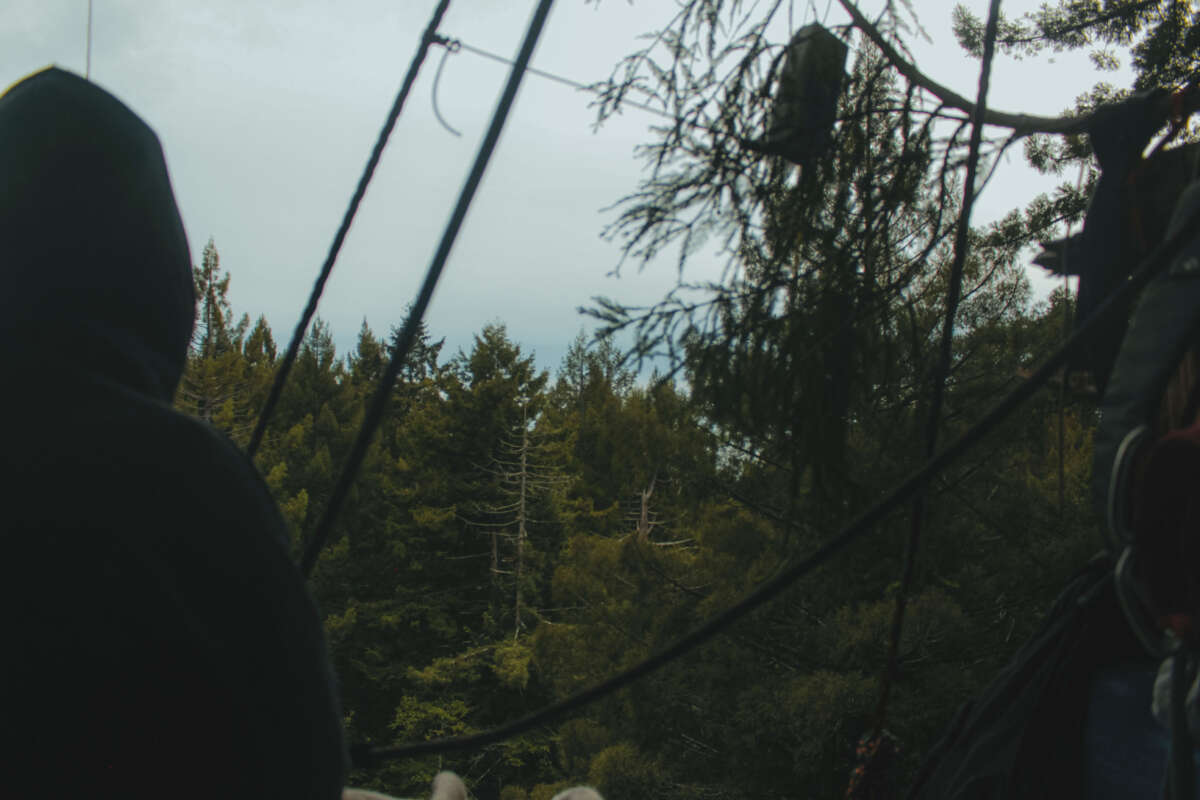
In the movement to defend the Atlanta forest and Stop Cop City, for instance, organizers have been harassed and hounded by authorities, dozens have been charged with terrorism and Racketeering Influenced and Corrupt Organizations charges, and one person has been murdered by police.
The movement is about far more than stopping one militarized police training facility; in its early days, there were all kinds of events in the forest, events that at first glance had nothing to do with directly opposing Cop City. There were forest walks, there was child care, concerts and parties, skill shares and potlucks that made the forest into a community center where people were invited in — not only to connect with each other but also to connect with the forest, to let the forest become a friend, a loved one. If people love the land as a friend or a family member, they will defend it, be they in Atlanta, Gaza, Ireland or the redwood forests. This, of course, threatens more than just a single Cop City. This threatens the entire system.
If people love the land as a friend or a family member, they will defend it, be they in Atlanta, Gaza, Ireland or the redwood forests.
This is a necessarily different stance than advocating for more sustainable destruction. For example, the Forest Stewardship Council (FSC) was founded in 1993 with what appeared at the time to be genuine and noble aims: reform industrial logging practices so as to repair and ultimately maintain healthy forests while of course keeping up with supply and demand. The problem, of course, is that with finite resources, you can’t always just grow, grow, grow. That’s what cancer does, and if unchecked, it kills its host. So today, the FSC certification is basically an inside joke. While timber products with FSC certification are oftentimes sold at higher price points (because, you know, capitalism), the idea that the timber comes to you via sustainable practices is belied by mountains of contrary evidence — from logging in protected areas and national parks to clear-cutting to trafficking in illegal timber to logging old growth to corporate cover-ups to railroading Indigenous peoples and ultimately, failing to protect forests.
Green Diamond, a company that owns more than 400,000 acres of forest in Northern California alone, is an FSC company. It’s also a clear-cutting company. This means more than just kneecapping hundreds or thousands of trees in one go. As Environmental Protection Information Center Executive Director and Staff Attorney Tom Wheeler describes, with language that could easily apply to the workflow of colonization: “It is clear cut and then herbicide application to kill all of the native growth, and all of the native plants. And then it is deliberately replanting of largely a monoculture crop in a density that is foreign to this area.” In short, there is nothing sustainable about this practice. There is nothing respectful or reciprocal and certainly nothing long term about this relationship.
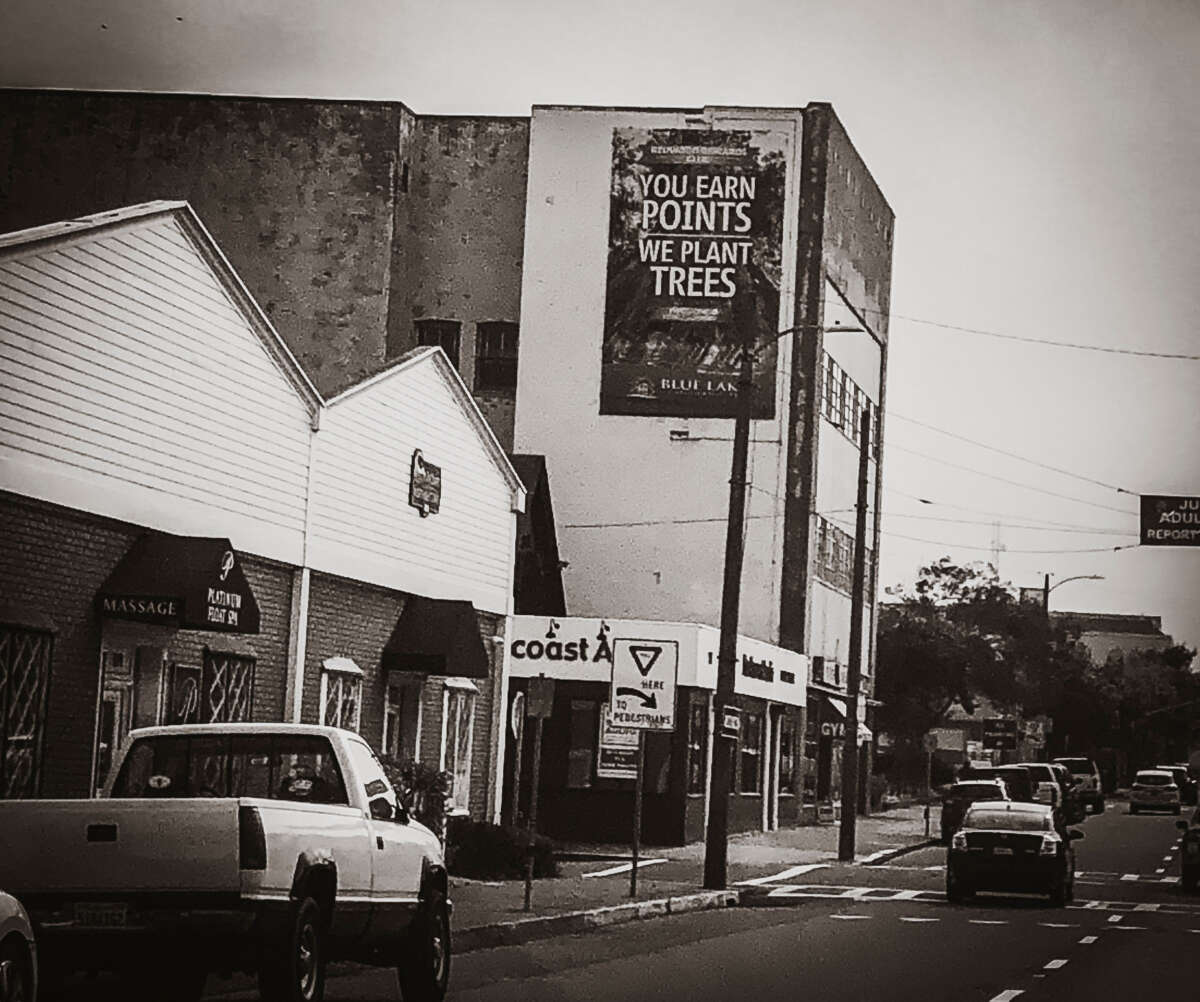
Such solutions still allow for oppressive and destructive practices, but with better window dressing, to make people far away from the havoc feel better about themselves. And the distance there is also key. In the redwood forests it’s known as the beauty screen, or visual impact. The idea is that you shouldn’t be able to see massive clear cuts like gaping wounds in the landscape. If the system is to continue chugging along, we must believe that beyond that slip screen of trees along the highway there are just more trees, protected and stewarded.
This work requires land back to Indigenous peoples. It is the rough road of decolonizing, of discarding the settler mindset.
This is why, to borrow a phrase, those ideas must die so that we can live — the ideas of sustainable industrial logging, of benevolent colonialism, of green capitalism. We must accept such phrases as oxymorons and undertake the difficult work of mourning what is lost, repairing what can be repaired and protecting what is left. This work requires land back to Indigenous peoples. It is the rough road of decolonizing, of discarding the settler mindset that we have grown up with, and learning again how to be human. There must be a revolution of thought before there can be a revolution in the trees, in the streets, before there can be true freedom, without fences, without borders, from the rivers to the seas.

Notes: Quotes used in this piece from people about/in Northern California redwood country are from Eleanor’s most recent documentary, To The Trees, available at ToTheTreesFilm.com
Trump is silencing political dissent. We appeal for your support.
Progressive nonprofits are the latest target caught in Trump’s crosshairs. With the aim of eliminating political opposition, Trump and his sycophants are working to curb government funding, constrain private foundations, and even cut tax-exempt status from organizations he dislikes.
We’re concerned, because Truthout is not immune to such bad-faith attacks.
We can only resist Trump’s attacks by cultivating a strong base of support. The right-wing mediasphere is funded comfortably by billionaire owners and venture capitalist philanthropists. At Truthout, we have you.
Truthout has launched a fundraiser to raise $34,000 in the next 5 days. Please take a meaningful action in the fight against authoritarianism: make a one-time or monthly donation to Truthout. If you have the means, please dig deep.
